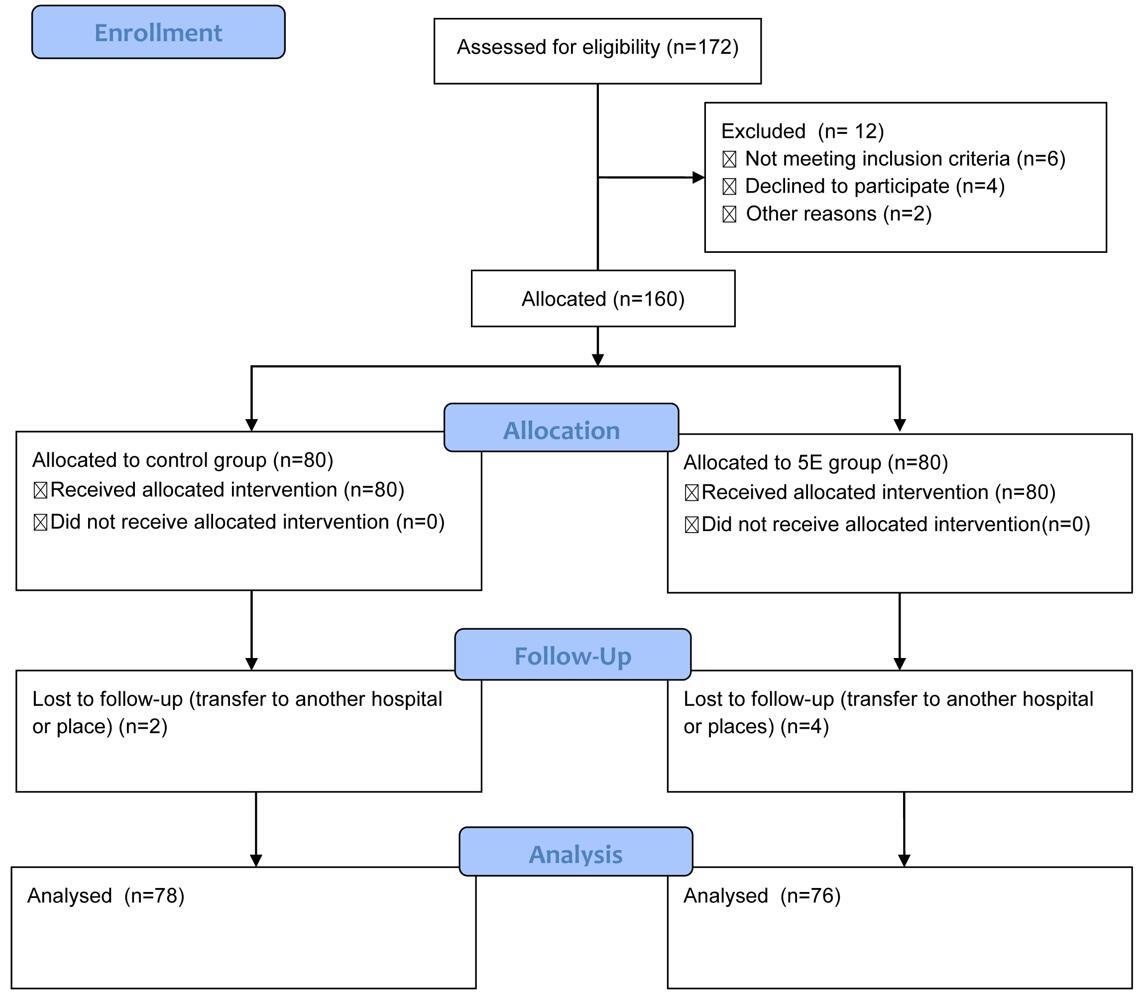Current issue
Archive
Manuscripts accepted
About the Journal
Editorial office
Editorial board
Section Editors
Abstracting and indexing
Subscription
Contact
Ethical standards and procedures
Most read articles
Instructions for authors
Article Processing Charge (APC)
Regulations of paying article processing charge (APC)
PUBLIC HEALTH / CLINICAL RESEARCH
5E-led hospital-community-family care in patients with lung cancer surgery: it does work
1
Department of Thoracic and Cardiovascular Surgery, Dushu Lake Hospital Affiliated to Soochow University, Suzhou, China
2
Outpatient Department, Dushu Lake Hospital Affiliated to Soochow University, Suzhou, China
3
Department of General Medicine, Dushu Lake Hospital Affiliated to Soochow University, Suzhou, China
Submission date: 2023-01-02
Final revision date: 2023-02-27
Acceptance date: 2023-03-19
Online publication date: 2023-03-26
KEYWORDS
TOPICS
ABSTRACT
Introduction:
Postoperative pulmonary rehabilitation is a very important part of the treatment and nursing care of patients with lung cancer. We aimed to evaluate the effects of the 5E (encouragement, education, exercise, employment and evaluation)-led hospital-community-family care model in patients with lung cancer.
Material and methods:
Patients with lung cancer undergoing surgical treatment in our hospital between January 1, 2021 and February 15, 2022 were selected. The patients were randomly assigned to the control and 5E group. The cardio-pulmonary function, quality of life and psychosocial adjustment level were evaluated and compared.
Results:
A total of 154 patients with lung cancer comprising 78 patients in the control group and 76 patients in the 5E groups were included. There were significant differences in the forced expiratory volume in 1 s (FEV1), forced vital capacity (FVC) at 1 month, 3 months and 6 months follow-up between the two groups (all p < 0.05). There were significant differences in the FEV1/FVC and peak expiratory flow (PEF) at 6 months follow-up between the control group and 5E group (all p < 0.05). There were significant differences in the 6 min walking test (6MWT), World Health Organization Quality of Life-100 Scale (WHOQOL-100) score and Self-report Psycho-social Adjustment to Illness Scale (PAIS-SR) score at 1 month, 3 months and 6 months follow-up between the two groups (all p < 0.05).
Conclusions:
The 5E-led hospital-community-family care model is beneficial to improve the cardiopulmonary function and quality of life in patients with lung cancer, which may be worth promoting and using in clinical care of patients with lung cancer.
Postoperative pulmonary rehabilitation is a very important part of the treatment and nursing care of patients with lung cancer. We aimed to evaluate the effects of the 5E (encouragement, education, exercise, employment and evaluation)-led hospital-community-family care model in patients with lung cancer.
Material and methods:
Patients with lung cancer undergoing surgical treatment in our hospital between January 1, 2021 and February 15, 2022 were selected. The patients were randomly assigned to the control and 5E group. The cardio-pulmonary function, quality of life and psychosocial adjustment level were evaluated and compared.
Results:
A total of 154 patients with lung cancer comprising 78 patients in the control group and 76 patients in the 5E groups were included. There were significant differences in the forced expiratory volume in 1 s (FEV1), forced vital capacity (FVC) at 1 month, 3 months and 6 months follow-up between the two groups (all p < 0.05). There were significant differences in the FEV1/FVC and peak expiratory flow (PEF) at 6 months follow-up between the control group and 5E group (all p < 0.05). There were significant differences in the 6 min walking test (6MWT), World Health Organization Quality of Life-100 Scale (WHOQOL-100) score and Self-report Psycho-social Adjustment to Illness Scale (PAIS-SR) score at 1 month, 3 months and 6 months follow-up between the two groups (all p < 0.05).
Conclusions:
The 5E-led hospital-community-family care model is beneficial to improve the cardiopulmonary function and quality of life in patients with lung cancer, which may be worth promoting and using in clinical care of patients with lung cancer.
Share
RELATED ARTICLE
We process personal data collected when visiting the website. The function of obtaining information about users and their behavior is carried out by voluntarily entered information in forms and saving cookies in end devices. Data, including cookies, are used to provide services, improve the user experience and to analyze the traffic in accordance with the Privacy policy. Data are also collected and processed by Google Analytics tool (more).
You can change cookies settings in your browser. Restricted use of cookies in the browser configuration may affect some functionalities of the website.
You can change cookies settings in your browser. Restricted use of cookies in the browser configuration may affect some functionalities of the website.



